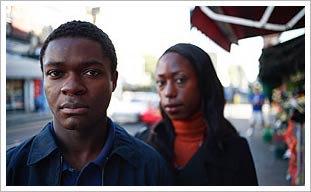By Marilyn Ferdinand
Shoot the Messenger is a humorous and profoundly uncomfortable film for any serious-minded, well-intentioned liberal to watch. As a white liberal, I found it particularly hard to react to. The film opens with a black man saying in an angry and anguished tone, “Everything bad that has happened in my life has happened because of black people.” It is tempting to think of the man as a successor to the unnamed protagonist of Ralph Ellison’s Invisible Man, a black man made profoundly self-loathing by racism. But in the spirit of the unintentionally ironic “feminist” ads for Virginia Slims cigarettes, “We’ve come a long way, baby.”

Joe Pascale (David Oyelowo), an angry young black man in good, updated British tradition, isn’t shown to be the victim of racism. He’s actually a buppie who wants to do something to help troubled black boys become proud and productive men. He attends a meeting at which the problem is being discussed, or rather, pinned on anyone and everyone, and finally hears something he can do. He can become a teacher and role model. He quits his good job in information technology and lands a teaching job at a local high school. He’s so proud as he stands in front of the school, with two boys washing some obscene graffiti from the front of it. He’s going to clean up, too, and uses a tough-love approach that Sidney Poitier’s character Mark Thackeray in To Sir, With Love would have approved of heartily.

Unfortunately, the black boys in his school have developed something the eventually grateful students Poitier taught didn’t have – pride. Three friends led by Germal (Charles Mnene) sit in the back of Joe’s class and lob jeers. One morning when the three are slow to enter Joe’s classroom, Joe grabs Germal’s shoulder and pushes him toward the door. Germal protests that teachers are not supposed to touch students. After Joe gives Germal and his friends numerous detention classes (in which Joe takes great pride for forcing the students to learn), Joe learns that Germal has filed an assault complaint against him. The principal tries to drop it, but Germal’s mother goes to authorities, and criminal charges are brought against Joe.
The media start calling. Joe initially resists making a statement, but as the heat becomes more intense, he goes on a radio show to tell his side of the story. Of course, the shock jock hosts broil him and condemn “the system” that does nothing to protect black children. Eventually, Joe is brought to trial and convicted, though he receives a suspended sentence. As he walks out of the courtroom, he is heckled by community protesters carrying signs that say “House Nigger.” Of course, he loses his job. After he cleans out his locker at school, the wall he took so much pride in keeping clean of graffiti gets tagged with Joe’s personal mantra: “Fuck Black People.”
Joe goes mad, and after a stint in an asylum, ends up on the streets. Sitting on a bench in the pouring rain, he sees an older woman, Sarah (Medina Aijikawo), struggling with her groceries. She’s black, and he’s reluctant to help, but does. After that, he becomes a crusade for her. A church lady, she brings parishioners and her preacher to his spot in the alley and encourages him to come to Jesus – which he does. He moves into her home, wears her son’s clothes, and attends her church. He notices that all the people in church are women. Where are all the men? Cut to prison, where Sarah visits her son Roy (Richard Pepple). Joe thought he was dead, but of course, he should have known: Most black men are incarcerated.
Eventually Joe tries to get a job, but his conviction (being appealed) hinders him. He and his job counselor Heather (Nikki Amuka-Bird) become romantically involved. She is a New Ager/self-helper who wears a hair weave and won’t let Joe touch her hair. When she is having a new weave put in, Joe takes some of the hair and burns it, forcing her to comb out her real hair into an afro. He is trying to work on her self-esteem. Instead, she breaks up with him because she doesn’t feel good about herself when she’s with him. Nobody does. His odyssey ends in the mental hospital to which he was admitted, where he encounters Germal for a final time and finally sees the fatal error that led him astray. The last shot challenges the audience, however, when Joe defies expectations and says he doesn’t take back a lot of what he said.
And what he says throughout this film in his direct-to-the-audience asides is dynamite in the cultural war within the black community. Joe would be a Joe Lieberman Republican in this country, a bit of a contradiction. He wants to help the beleaguered black community, but he does it from a condescending position. He is extremely hurt at how the community turns on him with their “House Nigger” signs, but in a way, he is. He is a classic boot-strapper who believes in individual responsibility and initiative, and refuses to accept arguments about slavery as excuses for the underachieving black community. Even Sarah says that blacks can’t be trusted because they pull each other down. They are the cursed people of Canaan to her.
The beauty of this film, though, is that it is more than a political satire. Joe’s pain at the rejection of his good intentions is extreme. Heather responds, “They broke your heart.” He tells Heather that a heckler threw a rotten vegetable at him and holds his chest, over his heart, to indicate where the object struck. “After that, I went cold,” he says. His later indictments include welfare mothers exemplified by Sarah’s daughter, who comes to Christmas dinner with her four children from four different fathers and abandons them and a hoochie-looking girl with decaled fingernails and a made-up name (L’Braia). Like all stereotypes, these are funny, have a grain of truth, and are extremely unsettling. Joe’s refusal to disown his disdain for that bad behavior of members of his race shows that the black experience finally can handle criticism.
Sharon Foster won the Dennis Potter Screenwriting Award for Shoot the Messenger, and it is a worthy honor for a television writer – this film was originally aired on BBC2 – working solidly in Potter’s no-holds-barred tradition and borrowing styles from a wide range of works, from Alfie to Homer’s The Odyssey. Director Ngozi Onwurah maintains a sharp, comic pace, while skillfully building the force of the more serious, dramatic elements of the film. Shoot the Messenger is a gleefully thoughtful tour de force.
My thanks to Charles Coleman, program director extraordinaire at Facets Cinematheque, for helping to clarify the humanity and politics of the black experience for me.
There is one more showing of Shoot the Messenger, Tuesday, October 17, at 6:30 p.m., at the AMC River East 21, 322 E. Illinois.
Marilyn Ferdinand is The Beachwood Reporter‘s resident film critic, and the proprietor of Ferdy on Films. Her exclusive coverage of the Chicago International Film Festival includes:
* “Better Than Fiction,” her opening guide to the festival.
* “Corruption and Comedy,” a review of The Comedy of Power, a French New Wave film whose themes will be instantly recognizable to anyone with even the sketchiest knowledge of Chicago politics.
* “Soul in Flames,” a review of Requiem, a remarkable film about modern-day possession and exorcism.
* “A Talent for Torment,” three reviews in one (Spirit of the Soul, Ode to Joy, Steel City) from a disappointing day at the festival.
* “Deep in the Heart of Dixie,” a review of Dixie Chicks: Shut Up and Sing, the inside story of the Dixie Chicks’ political and personal journey as Southern girls ashamed of their Texan president.
Posted on October 16, 2006


